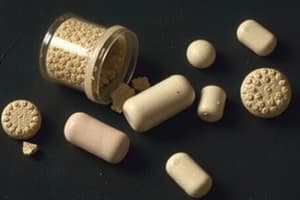Podcast
Questions and Answers
What does 'administer' mean in the context of controlled substances?
What does 'administer' mean in the context of controlled substances?
The direct application of a controlled substance by injection, inhalation, ingestion, or other means to the body of a patient by a practitioner, nurse, pharmacist, or ultimate user.
What is an 'agent' in relation to controlled substances?
What is an 'agent' in relation to controlled substances?
An authorized person who acts on behalf or at the direction of a manufacturer, distributor, or dispenser.
What does 'Bureau' refer to in the context of the Massachusetts Controlled Substance Act?
What does 'Bureau' refer to in the context of the Massachusetts Controlled Substance Act?
The Bureau of Narcotics and Dangerous Drugs.
Define 'controlled substance'.
Define 'controlled substance'.
What is a 'counterfeit substance'?
What is a 'counterfeit substance'?
Who is considered an 'ultimate user'?
Who is considered an 'ultimate user'?
What is the goal of the 'Establishment of Scheduled Drugs'?
What is the goal of the 'Establishment of Scheduled Drugs'?
What allows the commissioner to place a drug in Schedule I temporarily?
What allows the commissioner to place a drug in Schedule I temporarily?
Schedule I drugs have accepted medical use in treatment in the US.
Schedule I drugs have accepted medical use in treatment in the US.
Schedule II drugs have a high potential for abuse and can lead to severe psychological or physical dependence.
Schedule II drugs have a high potential for abuse and can lead to severe psychological or physical dependence.
Drugs classified under Schedule IV have a low potential for abuse.
Drugs classified under Schedule IV have a low potential for abuse.
Schedule VI substances do not include prescription drugs.
Schedule VI substances do not include prescription drugs.
What are 'Exceptions to Schedules'?
What are 'Exceptions to Schedules'?
What does 'Dispensing of Controlled Substances' refer to?
What does 'Dispensing of Controlled Substances' refer to?
Study Notes
Definitions of Key Terms
- Administer: Direct application of a controlled substance to a patient by an authorized individual (practitioner, nurse, pharmacist, or ultimate user).
- Agent: An authorized individual acting on behalf of a manufacturer, distributor, or dispenser.
- Bureau: Refers specifically to the Bureau of Narcotics and Dangerous Drugs.
- Controlled Substance: Any drug or substance categorized within a schedule or class.
- Counterfeit Substance: A substance falsely represented as a specific controlled drug or substance.
User and Drug Classification
- Ultimate User: A person legally possessing a controlled substance for personal use, household use, or a patient in a facility.
- Establishment of Scheduled Drugs: The commissioner regulates drug schedules based on various factors including potential for abuse, scientific evidence, and public health impact.
Drug Scheduling
- Schedule I: High potential for abuse, no accepted medical use, and lack of safety under medical supervision.
- Schedule II: High potential for abuse, accepted medical use, with possible severe dependence.
- Schedule III: Moderate potential for abuse, accepted medical use, with possible moderate or low physical dependence.
- Schedule IV: Low potential for abuse, accepted medical use, limited physical or psychological dependence possible.
- Schedule V: Low potential for abuse, accepted medical use, possible limited physical or psychological dependence.
- Schedule VI: Prescription drugs not classified in schedules I-V.
Regulation of Controlled Substances
- Temporary Placement of a Drug in Schedule I: The commissioner may temporarily place a substance in Schedule I to safeguard public health and safety, with a maximum duration of one year.
- Exceptions to Schedules: Certain compounds, mixtures, or preparations may be exempt if they include non-depressant or stimulant medicinal ingredients, reducing their abuse potential.
Dispensing Guidelines
- Dispensing of Controlled Substances: Preparations should not exceed 4 ounces within a 48-hour period per person. An accurate record must be maintained detailing the purchaser's name, address, preparation name, dosage strength, and dispensed quantity.
Studying That Suits You
Use AI to generate personalized quizzes and flashcards to suit your learning preferences.
Description
This quiz covers the definitions of key terms related to drug classifications and scheduling, including controlled substances, counterfeit substances, and the roles of authorized individuals. Test your understanding of the terminology and concepts surrounding drug administration and regulation.




